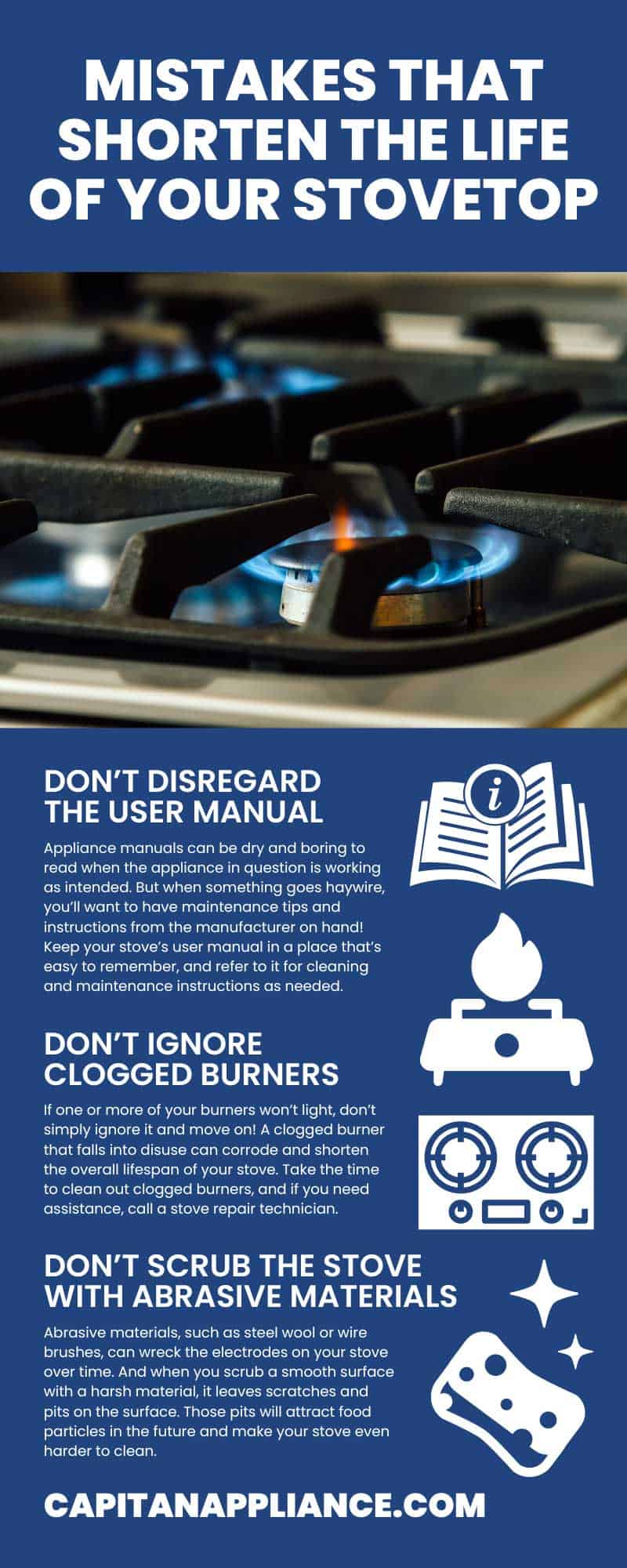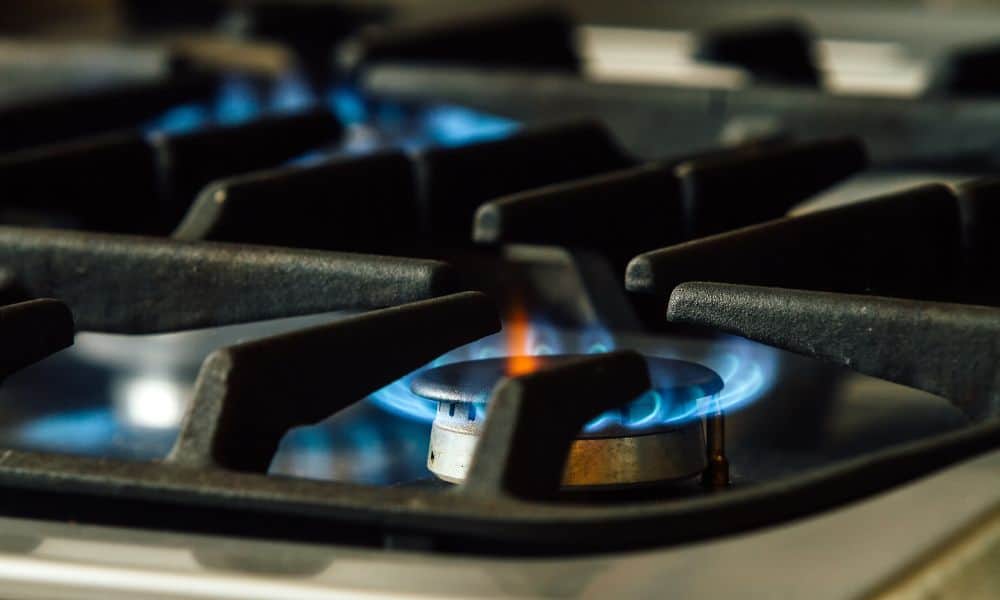From ignoring signs of wear and tear to wandering away from the stove while something’s cooking, the following blunders could shorten the lifespan of your stovetop! Keep up with regular appliance maintenance and avoid making these common mistakes to avoid costly repairs and keep your stovetop in good condition. Your stove is the heart of your kitchen. Treat it with the care it deserves!
Don’t Clean With Too Much Water
While water is necessary to clean bits of food and oil splatters off your stovetop, avoid the temptation to drown it just to get it clean. Using too much water when you clean your stovetop can encourage excess water to seep into the electrical components and cause a short.
Instead, use a damp microfiber cloth or kitchen sponge to clean food residue off your stovetop. You don’t need to soak it to get it clean!
Don’t Disregard the User Manual
When you first bought your new stove, what did you do with the user manual? Many homeowners answer, “I don’t know; I just stashed it away somewhere.”
Appliance manuals can be dry and boring to read when the appliance in question is working as intended. But when something goes haywire, you’ll want to have maintenance tips and instructions from the manufacturer on hand! Keep your stove’s user manual in a place that’s easy to remember, and refer to it for cleaning and maintenance instructions as needed.
Don’t Ignore Clogged Burners
Let’s say you’re going to cook something on the stovetop. You turn the knob to light a burner, and…it won’t light, so you simply move your pan to a different burner and light that one instead. Has this ever happened to you?
If one or more of your burners won’t light, don’t simply ignore it and move on! A clogged burner that falls into disuse can corrode and shorten the overall lifespan of your stove. Take the time to clean out clogged burners, and if you need assistance, call a stove repair technician.
Don’t Scrub the Stove With Abrasive Materials
Getting food stuck on your stovetop is annoying, and you may believe that steel wool or other highly abrasive materials will fix your problem. And while it will remove that crusty food in the short term, the long-term effects of abrasives will shorten your stove’s lifespan.
Abrasive materials, such as steel wool or wire brushes, can wreck the electrodes on your stove over time. And when you scrub a smooth surface with a harsh material, it leaves scratches and pits on the surface. Those pits will attract food particles in the future and make your stove even harder to clean.
Don’t Wander Away While Something’s on the Stove
Waiting for your food to cook often takes time; a watched pot never boils, right? However, if you’re actively cooking food on your stovetop, stay in the kitchen. Keep your cooking within your line of sight.
Getting distracted while cooking food on the stove can lead to pots boiling over or hot oil crackling and splashing all over the place. Those spills and splashes can be difficult to clean up later, especially if food or oil gets stuck. If you do make a mess on the stove due to inattention, clean up any spills or debris right away to avoid damaging your stove.
Don’t Ignore the Warning Signs of a Gas Leak
A gas leak isn’t just dangerous to the integrity of your stove; it’s also extremely hazardous to the health of anyone living in the house. If any of the following signs apply to your stovetop, call for stove repair services in Indianapolis right away to remediate the leak.
- The flame on your stove is yellow or orange instead of blue
- You smell gas before you even turn on a burner
- You hear a slow hissing sound near the gas lines
- There are black soot marks bordering the outside of your stove
Do these warning signs sound familiar? Turn off your stove, open your windows, and call a repair technician as soon as possible. Do not light any matches or try to burn candles to cover up the smell until they fix the gas leak and give you the all-clear.
Don’t Use Sharp Objects To Remove Buildup
Sometimes, messy cooking accidents happen. Whether a pot boils over or you spill the contents of a saucepan, a variety of food-based messes can cause buildup on your stove. However, you should never go at stubborn buildup with knives or razor blades.
Much like the abrasive materials we discussed earlier, razor blades and kitchen knives can leave permanent pits and marks on your stovetop. When the stove’s surface is uneven, future food messes can seep into those gouges and pits and become nearly impossible to remove. Go easy on your stovetop and remove buildup with a plastic or silicone spatula instead.
Don’t Attempt To DIY Stove Repairs
Many homeowners miscalculate how serious or in-depth appliance repairs really are, thinking, “I don’t need a repair technician for such a minor fix! I’ll just do it myself.” They get as far as taking apart the stovetop—then realize they don’t know what they’re doing.
Generally speaking, it is best practice to leave the stovetop repairs to the professionals. You may be able to clean out a clogged burner by yourself, but in-depth electrical repairs and replacing broken parts are easier done by repair experts. Trying to fix your stovetop without professional help can cause further damage and even irreparable harm to the inner workings of the stove.
Want to keep your current stovetop in great condition for years to come? Be conscientious about the way you use your stovetop, and avoid making these common mistakes. Using harsh materials to clean it or ignoring signs of deeper problems will shorten your stovetop’s lifespan.
If you do experience problems with your gas or electric stovetop, don’t hesitate to call Capitan Appliance to schedule a repair appointment. We’re happy to help you get your kitchen back to full functionality!


